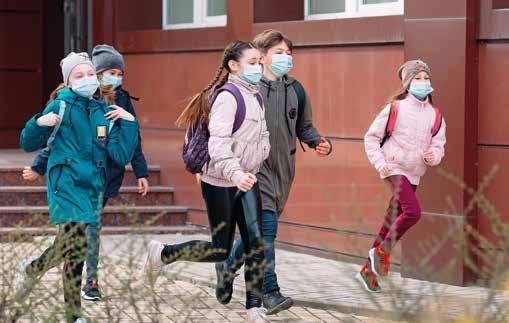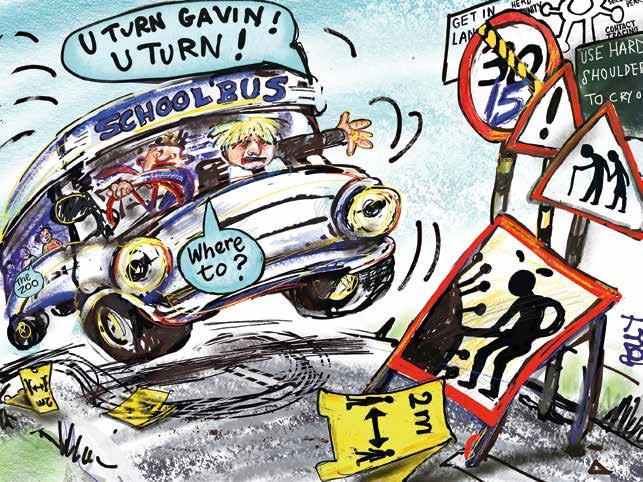
5 minute read
International
England’s school reopening policy in context
AFTER closing schools to prevent the spread of Covid-19, countries around the world are taking tentative steps toward wider reopening.
While safety of pupils and teachers is the yardstick, just how education authorities intend to reopen schools and safeguard community health varies between countries.
Are we comparing like for like?
Phased reopenings arrive as world leaders wrestle with restarting economies and protecting public safety. Wellbeing and inequality trade-offs in the face of closed classrooms are also central to decisionmaking. However, consensus exists among epidemiologists that relaxing of lockdown measures must coincide with a reduction in transmissions to manageable levels.
Since the UK Government announced plans for wider opening of primary schools in England from 1 June, Denmark, Germany and the Netherlands have been used as points of reference by some, including the Secretary of State for Education. But all comparisons must be contextualised.
As of mid-June, the UK had recorded 597 Covid-19 deaths per million people, compared to 354 in the Netherlands, 104 in Germany and 102 in Denmark. At the respective times that wider openings began, UK daily confirmed Covid-19 deaths and cases were comparatively higher. The contrasts are stark.
Is June too soon? Is September safer?
Spain and Italy, two of the three European countries with a similar death rate per capita to the UK (the other being Belgium), have closed their schools until September. Social distancing would be impossible in Spanish schools, concluded a specialist paediatric taskforce formed by the government.
A similar consensus was reached in Italy and Ireland. In the US, all but a few states have announced school closures until September, citing the impossibility of reopening schools in a way that would keep children, staff and the community safe.
Closer to home, Scotland, has targeted reopening by August.
Limited, cautious, with strict hygiene
In Germany, schools first reopened to graduating students and those taking exams. Primary schools began opening in early May, but classes have been split in two, with pupils alternating between school and home for lessons. Schools must be individually riskassessed to determine whether safe opening is possible, according to the German Education Union (GEW). Decisions on reopening are being taken at state level, providing flexibility where the R rate differs across the country.
In France, against the advice of his scientific counsel, President Emmanuel Macron reopened schools for early years and primary aged children from 11 May. As Educate went to press, all schools were set to open at the end of June after the whole of France was marked a ‘green zone’ – signalling zero hot spots.
French unions secured agreement for additional requirements to be put in place, including a reduction in class sizes from 15 to ten and the wearing of face masks.
Other countries, including the Netherlands, have similarly opted for phased re-openings. Half a class will attend school one day and the other half will attend the next.
Denmark reopened primary schools in April. Face masks are worn by staff, lunches are staggered, class sizes are below ten, and many lessons are taking place outside. Sweden never closed its schools, opting instead for strict hygiene and social distancing measures.
Wider opening, so far, has not been linked to national increases above 1 in the R rate. However, it is still early days and in many countries being used as comparisons, there was a very low baseline rate of infection.
Internationally, policy responses to reopening schools have been patchwork. Some have prioritised the return of older children, others younger children, while several countries have deemed it unsafe to reopen schools until September. The UK Government, for example, has now U-turned on plans to return all primary schools before the summer.
What is consistent is that openings have been limited, cautious, accompanied by strict hygiene measures and have often taken place only when deaths and cases were markedly reduced and under control. By Tom McEwan, NEU international policy officer
How can you help?
Donate at care4calais.org/donate-now and affiliate your branch or district at care4calais.org/get-involved/campaign
Jenny Leonard (jennyleonardart.com) created this artwork incorporating observations on the crisis from NEU members and districts who contributed to the fundraiser

NEU raises thousands for Calais refugees
SINCE authorities cleared the Jungle camp in Calais in 2016, refugees have had no permanent site and are forced to sleep in industrial estates and wastelands, subjected to frequent evictions and police brutality.
Without sanitation provision, a pandemic poses a huge threat to those having to endure such appalling conditions. The impact of Covid-19 for refugees has been devastating.
The French state’s food provision has been halved and it is reported that refugees are more afraid of starving than catching the virus. Care4Calais has been a vital distributor of food and was the only charity in operation in that area during France’s lockdown.
The charity’s founder, Clare Moseley, said: “Coronavirus has made a bad situation life-threateningly worse. People are squeezed into small areas, they can’t social distance, and the support they relied on for survival is drastically reduced. The French travel ban makes it impossible for them to leave, but still they face forced, sometimes violent, evictions almost every day.
“These people are fleeing terrifying situations in some of the most dangerous parts of the world. They head for the UK because they want to be safe. Many have family or other connections, and others know our language and want to integrate and contribute.
“Now more than ever we need to give them a safe and humane way to have their requests for asylum fairly heard.”
The NEU has become a regular supporter of Care4Calais, sending delegations of members to volunteer.
Unfortunately, due to border restrictions, the last delegation was cancelled so the London International Solidarity Network set up a crowdfunder in April. Thanks to the generosity and solidarity of NEU districts, members and friends in England and Wales, £12,781 was raised.
n NEU members also celebrated Refugee Week (15-21 June), with a series of online opportunities to learn about the challenges faced by refugees and celebrate their contributions to society.
The 127,000 refugees who live in the UK face significant inequalities, so this year’s theme was Imagine. Participants were invited to explore how their schools, communities and the UK could better welcome and support refugees. Visit refugeeweek.org.uk










